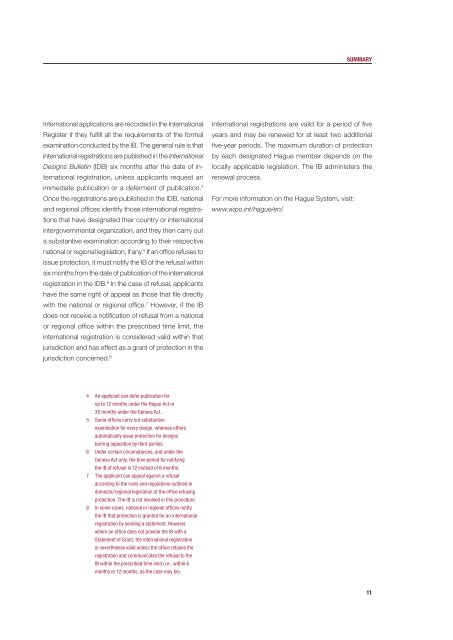wEyG1
wEyG1
wEyG1
Create successful ePaper yourself
Turn your PDF publications into a flip-book with our unique Google optimized e-Paper software.
SUMMARY<br />
International applications are recorded in the International<br />
Register if they fulfill all the requirements of the formal<br />
examination conducted by the IB. The general rule is that<br />
international registrations are published in the International<br />
Designs Bulletin (IDB) six months after the date of international<br />
registration, unless applicants request an<br />
immediate publication or a deferment of publication. 4<br />
Once the registrations are published in the IDB, national<br />
and regional offices identify those international registrations<br />
that have designated their country or international<br />
intergovernmental organization, and they then carry out<br />
a substantive examination according to their respective<br />
national or regional legislation, if any. 5 If an office refuses to<br />
issue protection, it must notify the IB of the refusal within<br />
six months from the date of publication of the international<br />
registration in the IDB. 6 In the case of refusal, applicants<br />
have the same right of appeal as those that file directly<br />
with the national or regional office. 7 However, if the IB<br />
does not receive a notification of refusal from a national<br />
or regional office within the prescribed time limit, the<br />
international registration is considered valid within that<br />
jurisdiction and has effect as a grant of protection in the<br />
jurisdiction concerned. 8<br />
International registrations are valid for a period of five<br />
years and may be renewed for at least two additional<br />
five-year periods. The maximum duration of protection<br />
by each designated Hague member depends on the<br />
locally applicable legislation. The IB administers the<br />
renewal process.<br />
For more information on the Hague System, visit:<br />
www.wipo.int/hague/en/.<br />
4 An applicant can defer publication for<br />
up to 12 months under the Hague Act or<br />
30 months under the Geneva Act.<br />
5 Some offices carry out substantive<br />
examination for every design, whereas others<br />
automatically issue protection for designs<br />
barring opposition by third parties.<br />
6 Under certain circumstances, and under the<br />
Geneva Act only, the time period for notifying<br />
the IB of refusal is 12 instead of 6 months.<br />
7 The applicant can appeal against a refusal<br />
according to the rules and regulations outlined in<br />
domestic/regional legislation of the office refusing<br />
protection. The IB is not involved in this procedure.<br />
8 In some cases, national or regional offices notify<br />
the IB that protection is granted for an international<br />
registration by sending a statement. However,<br />
where an office does not provide the IB with a<br />
Statement of Grant, the international registration<br />
is nevertheless valid unless the office refuses the<br />
registration and communicates the refusal to the<br />
IB within the prescribed time limit (i.e., within 6<br />
months or 12 months, as the case may be).<br />
11


